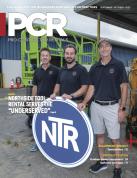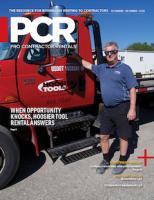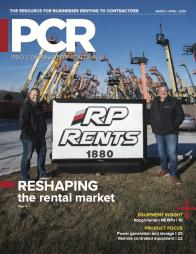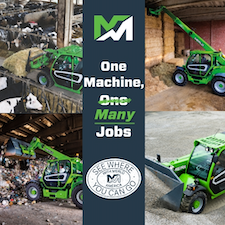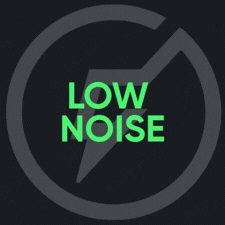Finding the pressure point
How to select the right pressure washer
Among the multitude of products that rental centers offer, pressure washers are not the most complicated. But that doesn’t mean finding the right pressure washer is always easy. An underpowered pressure washer won’t get the cleaning job done,
leaving the customer disappointed at best and angry at worst. On the flip side, renting out an oversized unit leads to extra cost and inconvenience, on top of the potential risk of damaging property with unnecessary power.
To help determine the right pressure washer, education is the answer. It takes an understanding of the
machine, the application and the cleaning process itself to make the most appropriate selection.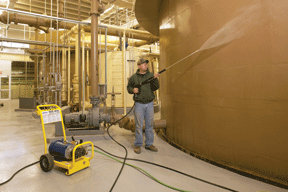 Hot or cold?
Hot or cold?
As with any learning process, it’s best to start with the basics. In the case of pressure washers, this means figuring out whether a hot- or cold-water unit is needed.
Cold-water pressure washers are the most popular option. They’re compact and economical, and they’ll do the trick for a large number of cleaning jobs. Generally, cold-water units are best at washing away dirt and mud. That alone covers a lot of applications, from washing a construction vehicle to cleaning concrete.
Where cold water falls short, however, is removing grease or grime – dirt that is ingrained or clinging to a surface. A cold pressure washer may push these substances around, but it won’t produce a clean surface. For
instance, if the machine is used to clean the fifth wheel on a tractor-trailer, it will likely splatter and smear the heavy grease, rather than wash it off.
When dealing with grease, grime and oil, a hot-water pressure washer is usually a better choice. That’s because hot water actually cuts through grease, loosening it from the surface. Once the bond between the grease and the surface has been broken, it can then be washed away.
Also, remember that either a hot or cold pressure washer’s performance can be enhanced by using cleaning chemicals. There are a variety of detergents available for use with pressure washers, and using the right one can help the cleaning process go much more smoothly.
Power preference
Both hot and cold pressure
washers are available with electric motors or gas-powered engines. This decision is largely based on where the machine will be used. If it will be operated outdoors without adequate electrical sources nearby, then a gas-powered unit is the best bet. Otherwise, many people prefer electric motors for their cost efficiency, low maintenance and quiet operation. Keep in mind that many of the higher-powered electric pressure washers require a 230-volt, three-phase power source, which isn’t readily available in many locations.
If selecting a hot pressure washer, a person must also choose one of three options for heating the water – oil-fired, gas-fired or electric. The most popular choice is oil-fired, which can use diesel, fuel oil or kerosene to heat the water. These units are highly portable, and the fuels are affordable and readily available.
The next option is gas-fired, which means the machine can burn either natural gas or LP gas. However, this option is typically reserved for stationary pressure washers that are hard-plumbed into the gas system of the building where they are located.
The third option is to use electricity to heat the water. Although convenient and highly portable, these units use high voltage and draw high current. Therefore, these products are only recommended if the operator has easy access to such electrical sources.
Spec check
After deciding on the type of pressure washer, next determine what specifications will best meet the needs. Pressure, volume and horsepower ratings are often misunderstood, but they play a large role in the performance of a pressure washer.
Start by considering pressure. Simply put, its purpose is to help break the bond between the contaminant and the surface being cleaned. If the pressure is too low, the bond won’t break without extra help from hot water or detergents. If the pressure is higher than what’s needed, the dirt will blow around more, and the high-pressure spray may even damage the surface.
With this in mind, it’s best to find a happy medium — a pressure washer that has adequate ratings for the type of use it will experience. For instance, if the customer will mostly be washing his vehicles, a 1,500-psi unit may work fine. If washing agricultural, construction or mining equipment, consider using at least 2,000 psi. For industrial jobs, 3,000 psi or more is often required.
Many people assume that pressure is the only important rating of a pressure washer, but that’s not true. Volume, which is stated in gallons per minute (gpm), equally affects cleaning performance. After the pressure has broken the bond between the contaminant and the surface, the contaminant must be washed away. And the greater the flow of water, the better the substance rinses off. Contractors rely on high-volume units to complete their cleaning jobs quickly.
Although one might assume that a high-volume pressure washer would only consume large amounts of water, this is not necessarily the case. The average garden hose dispenses between 6 and 8 gpm, while the average pressure washer only puts out 3 to 4 gpm. Therefore, even the highest-rated pressure washers usually offer some type of water savings.
The third factor, horsepower, is useful because it determines how much pressure and volume a pressure washer can produce. For example, a 3,000-psi, 4-gpm unit requires at least an 11-horsepower gas engine to achieve those outputs. Anything less than 11 horsepower will deliver less pressure and volume than the pump’s actual rating.
Basic formulas can be used to calculate the minimum horsepower requirements of a machine. Note how electric-powered units use a different equation than gas-powered:
Electric motor horsepower requirement: (psi x gpm)/1460
Gas engine horsepower requirement: (psi x gpm)/1100
Another way to look at the pressure and flow ratings is through cleaning units. This factors in both psi and gpm to help compare the cleaning power of pressure washers. To come up with this number, simply multiply the pressure and volume specifications. For instance, a 3,500-psi, 3.8-gpm machine would have 13,300 cleaning units, while a 3,000-psi, 4.5-gpm unit would have 13,500 cleaning units. In this scenario, the second unit would offer higher performance.
Durable designs
Of course, reliability also plays an important role in the pressure washer selection process. Before deciding on one, carefully inspect the unit and pay attention to the details. For starters, is the frame constructed of thick steel? Considering the amount of abuse many pressure washers receive, this can make a huge difference in the longevity of a machine.
Also, check the quality of the engine or electric motor. Is it made by a reputable manufacturer? Does it have adequate horsepower to drive the pump? If the answer to these questions is yes, then the operator is more likely to experience satisfying results.
Next, make sure the pump can handle the workload. Ceramic plunger pumps are regarded as the highest quality in the industry, and the best ones are designed to run for 2,000 hours or more, as long as they’re well maintained. Compare this to pressure washers intended for occasional homeowner use, which may have a service life of only 100 to 200 hours.
One of the most important components is the unloader valve, which experiences more wear and tear than any other part of the pump. The unloader valve activates every time the spray wand’s trigger is released, allowing water to cycle through the pump, so if it’s not functioning properly, it can lead to significant damage. Therefore, ensure that this component is high quality and easy to replace before selecting a unit.
While the guidelines for selecting the right pressure washer aren’t complicated, they are important to understand in order to ensure customers can rent a unit that gets the job done effectively and efficiently. Learning these guidelines will be well worth the time for your rental operation. And, customers will find their pressure washer rentals to be well worth the money.
This article was prepared by Daniel Leiss, president, Jenny Products Inc. www.steamjenny.com
Originally published in the January/February 2014 issue of Pro Contractor Rentals. Copyright 2014 Direct Business Media.





